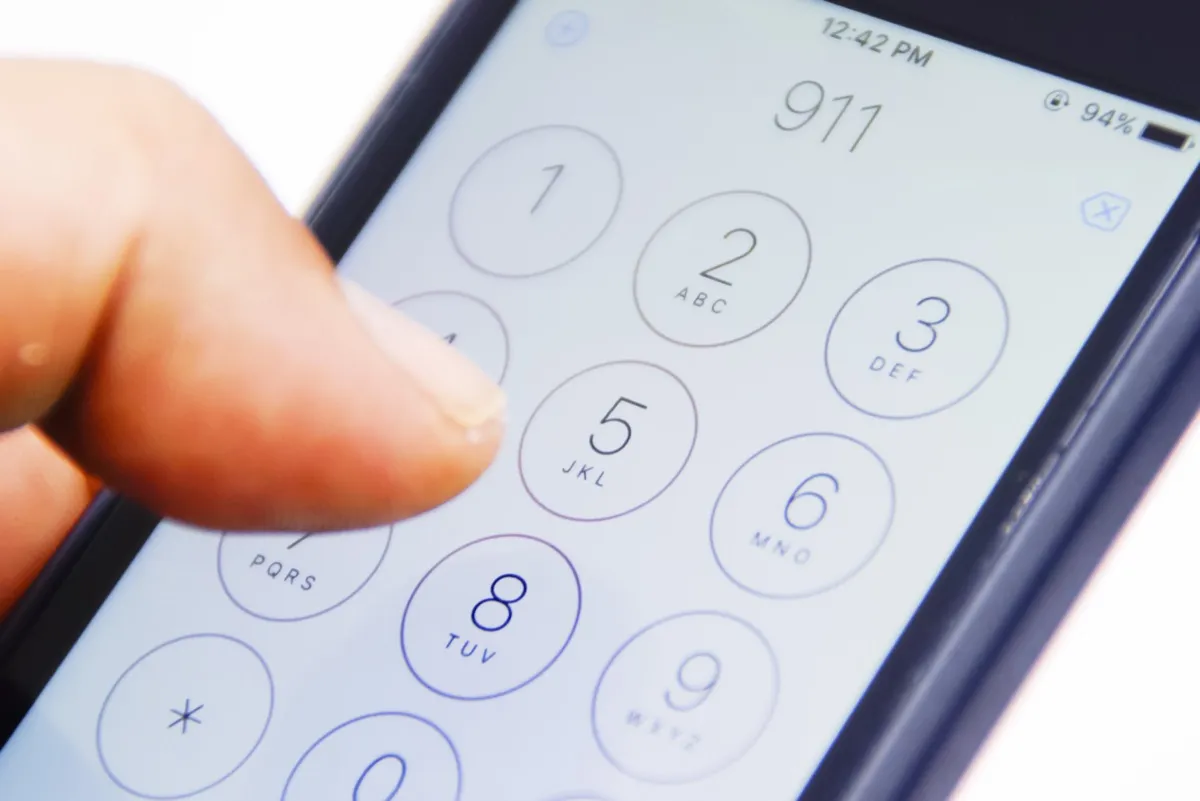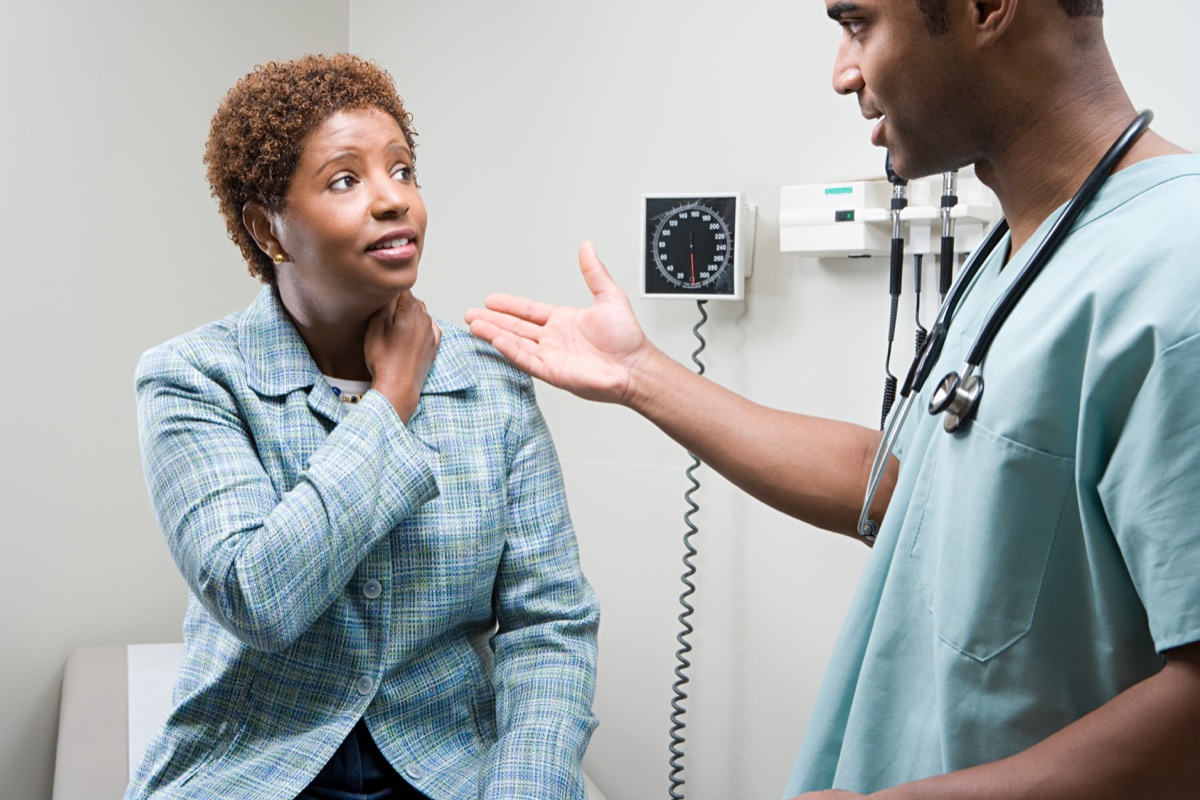Er for Emergencies Only Man Cold Funny
You rush to your local ER with a broken leg, fill out all the paperwork, and have a seat. Then: nothing. Nada. For three hours, you wait. When you finally see a physician, she then sends you home with a cast and a referral to an orthopedic doctor.
Twelve endless hours later, you're finally home. What gives?!
Well, there's a lot going on behind the closed double doors of the emergency room. The staff's job is to keep up appearances of efficiency and order, so you're probably not aware of half of the chaos. Here, the nation's top doctors and nurses spill their secrets, with one thing in mind: Giving you better care, and some perspective about what's really going on. Read on, and to ensure your health and the health of others, don't miss these Sure Signs You've Already Had Coronavirus .

Even if your ER nurse seems cool, calm, and collected, he or she may have just witnessed a horrible event. ER staff members are trained to have poker faces and pride themselves on not bringing in the negative emotions of other cases to your room.
Dr. David Gatz, MD, an emergency physician at Mercy Medical Center in Baltimore, says: "No matter who you are, I walk in with a smile on my face. The reality is I may have just pronounced someone deceased three rooms down or told a mother she's have a miscarriage. It can be a real challenge to silo those emotions and walk into each new room as if nothing is wrong."

There's no need to be embarrassed if you have a strange condition or symptoms. Chances are, your ER staff has seen it before and you're not the first one to walk in for treatment. According to Dr. Gatz, MD, "Patients are often afraid to admit drug use or uncommon sexual practices. The reality is your ER staff has seen it all. Nothing surprises us anymore."

To reduce your time in the waiting room, you can have your doctor contact the ER so the staff knows to expect you. The clerk will complete a "pre-expect" form for you and if there's room, you may be taken back for treatment right when you arrive. If there isn't a room for you right away, your wait time may still be less than if you walked in without asking your doctor to call ahead.

ER staff, including the department clerks, doctors and nurses, have no way of knowing what your insurance covers or what you'll be responsible for financially during your visit. It's up to you to contact your insurance company to see about coverage and the co-payment and/or deductible you may need to pay based on your treatment.

According to Anthony Kouri, M.D., Orthopedic Surgery, University of Toledo Medical Center, "If you bring a child to be treated at a hospital that has no pediatric care, you will waste a lot of time and a lot of money. If you can help it, research where to go before you leave. For instance, if you have a bad burn, it's better to go to a higher-level trauma center with dedicated burn specialists than a small community hospital."

According to Dr. Kouri, MD, "The clerks in the waiting area do not like vomit. If you are in the waiting area and begin to vomit profusely, you will be moved more quickly into a room."
However, we don't suggest this as a healthy strategy to get treated quickly.

Your urine can tell medical professionals a lot about what's going on with your body. Before you run to the restroom while waiting in the ER, check in with your nurse. If he or she wants to perform a urinalysis on you, you'll need to have the test completed when you pee. Otherwise, it could be a long wait until you have to go again and can get the test done.

When ER staff asks you to assess your pain level from 1 to 10, they're looking for an honest answer. If you say "11" or "125," you're not helping them to learn more about what you're feeling.
When it comes to exaggerated pain range answers, Licensed Paramedic Mike Gnitecki from UT Health East Texas states, "I understand that the patient would like their pain treated, but sometimes such a high number doesn't appear as credible. I would suggest sticking to a number in the '1' to '10' range."
Use the pain range scale truthfully so the ER staff can get better insight on where you truly hurt and where you're only feeling discomfort. This can help them diagnose and treat you faster.

According to Dr. Adarsh Vijay Mudgil, M.D., owner of Mudgil Dermatology, "Evenings are the absolute worst time to go to the ER—you can most certainly expect long waits, especially on a Monday night!"
Early morning hours, such as 3 or 4 a.m., are known for being the least busy in most hospital emergency rooms. Dr. Mudgil also warns, "There is a shift change (usually around 7 a.m. and 7 p.m.) where the doctors and nursing staff change. This can also cause delays in being seen."

If your situation isn't an emergency, such as a simple cold that's lasted a few days, don't come to the ER. According to the CDC, "The emergency room should be used for people who are very sick. You should not go to the emergency room if you are only mildly ill."
It's frustrating for emergency room staff to see the waiting room filled with cold sufferers because it uses up resources. In most of these cases, you'll be sent home and asked to make an appointment with your physician anyway.

It's the job of the emergency room clerk to rank visitors in order of severity and need. Therefore, if there's a patient who's been involved in a car accident with life-threatening injuries or who's just experienced a heart attack, he or she will be taken back before you will if you only have a broken bone or stomach pain.
Dr. Kouri wants you to keep in mind, "We don't make you wait because we don't care. We make you wait because there is something more urgent ahead of you."

A little "please" or "thank you" can make an ER nurse's day. With so much chaos going on around them, simple niceties are appreciated by the emergency room staff. If you're kind, you'll get kindness from the staff in return.

Emergency room staff wants you to leave the hospital understanding your treatment plan and the next steps. If you don't understand the diagnosis or what you're supposed to do to follow-up, ask questions. Doctors may be intimidating, but they want to be sure you're clear on your diagnosis and how to take care of yourself if you're not being admitted to the hospital. Keep in mind, the hospital staff is also focused on your recovery and they don't want you to have to come back for another visit.
Dr. David A. Farcy from Mount Sinai Medical Center in Miami Beach, Florida states, "I know doctors are busy, but I tell friends not to leave without asking questions…And don't be afraid to ask a doctor to explain something in terms you can understand!"

While 911 shouldn't be abused, in a true emergency, ER staff encourages you not to attempt to drive yourself to the hospital. According to Dr. Kathleen Handal, MD, "If you are acutely ill or injured, are having trouble breathing, chest pain or experiencing extreme weakness, call 911 or your local emergency medical services number. Lifesaving treatment can begin before arriving in the ER."

Even if you do call 911 and arrive to the ER in an ambulance, you may still be asked to have a seat in the waiting room. If all rooms are full and there are more dire emergencies currently being treated, you won't be the first in line. The triage nurse will rank your condition and place you in line based on the severity of your situation.

It's important to understand what truly constitutes an emergency and a trip to the ER. According to a CDC study, almost 80% of ER visitors came because they were worried about the severity of their symptoms. About 15% visited the ER because their regular doctor's office wasn't open and about 5% simply didn't have access to another medical provider. If you can safely wait out your symptoms until your doctor's office opens the next day, skip your visit to the ER.

Once you're in the ER, don't downplay your symptoms. Explain what hurts and accurately describe your pain level. If you feel the pain is getting worse as you wait, communicate this to a staff member as soon as possible. The more descriptive you can be about the pain and discomfort you're feeling, the easier it'll be to diagnose and treat you.

You can decrease your time in the ER if you listen to the nurse and physician and don't hesitate to follow instructions the first time. Emergency room staff appreciates it if you put on your hospital gown the first time you're asked or stay in bed when instructed. These instructions are usually provided for your safety, best interests, and to diagnosis and treat you as quickly as possible.

Emergency room staff can't diagnose you accurately or provide effective treatment without knowing what current medications you're taking. Even worse, if you don't provide thorough information on your medications, the treatments provided by ER staff can sometimes be dangerous. If you can, bring your medication bottles with you to the ER, take pictures of them, or jot down notes with names and doses to give to staff when you get there.

It can be helpful to bring a relative or friend with you to the ER for support and to help you explain your symptoms. However, a small hospital room filled with visitors in a busy emergency room can be frustrating for ER staff who are trying to treat you. Some ERs don't even allow for more than one person in each room. Review your hospital's rules before inviting multiple people into the treatment room and consider leaving your entire family at home or in the waiting room.

Experienced ER staff can spot a patient who's simply looking for a painkiller prescription a mile away. If you don't seem to be experiencing much pain and you ask for a specific prescription drug by name within the first five minutes of your visit, it's a red flag that you don't really have an emergency.

Emergency room nurses and physicians aren't like hairdressers. They don't want to gossip about other professionals in the field and they won't have sympathy for your past experiences with other medical providers. Complaining about your previous physician won't make you a favorite with the ER staff, so refrain from gossip and just give them the facts about your medical history and condition.

The emergency room is a stressful work environment where staff is constantly second-guessing the decisions they've made. By discussing your case with other nurses and physicians, they can get more clarity on a potential diagnosis and another opinion on your treatment plan.
Sometimes ER staff may simply want to vent about patients or talk about how weird their symptoms are. But don't worry, medical professionals cannot legally discuss you or your case outside of the hospital.

According to a study by the Center for Disease Control, out of the 145.6 million annual ER visits throughout the U.S., only about 12.6 million usually result in admission to the hospital. It's the duty of the ER staff that's treating you to decide whether you need to be admitted. They're taking into account your condition and the treatment plan they feel you need to follow when deciding whether or not to admit you into hospital care.

Emergency room staff is listening to your every complaint and taking all your symptoms into account. Since you've come to the ER, they'll take your situation seriously and attempt to figure out how to help you.
Wayne Gravell, PA, CEO/President of ImperativeCare, Inc. comments, "We take every patient seriously and we will take you seriously too when we get to your chart in the rack."

Since honesty is all the emergency room staff asks for when trying to diagnose you, you'll need to reveal it all. If you feel uncomfortable talking about sensitive and private issues with friends or family members in the room, ask for a private moment with the physician. He or she will be happy to oblige and gather as much personal information as possible to help you.

One-word answers aren't helpful when emergency room nurses ask about your symptoms, history, and pain levels. Try to be as descriptive as possible so they can better understand what you're feeling. You can't over-share with a medical professional, even if you feel like they probably already have information in your record.
Larry Burchett, M.D., ER physician, says "Tell your doctor not only what your symptom is, but why it brought you to the ER. Make sure the doctor understands both the what and the why."

The emergency room is not a place to visit when you've already been diagnosed by a doctor and are simply looking for a second opinion. You should only visit the ER in case of an emergency and not for treatment for a chronic problem that your primary care physician is already helping with. Not only are you wasting space in the ER, your visit can also be much more expensive than seeing your usual medical provider with a scheduled office visit.

Christopher Hanifin, M.S., PA-C, Department Chair and Assistant Professor Department of Physician Assistant at Seton Hall University states, "Tons of people show up to the ER and are surprised to be sent home without a firm diagnosis. We always do our best to arrive at a solid diagnosis, but if not, our back up plan is to determine if you can be sent home to follow up without a major risk to your health."

According to Mike Gnitecki, "When x-rays or CT scans are done, they are usually 'read' by a trained radiologist who does not work in our ER. They often work for a service that employs trained radiologists who read scans all day. While the quality of their interpretation is high, it usually takes around 30-45 minutes for the scan to be read. So please be aware of this lag time when you're waiting for scan results."

While medical professionals want you to be educated about your symptoms and prepared for potential diagnosis, they also want to be sure you understand that Google and medical websites are not the end-all be-all medical resources. In some cases, doing too much research on the Internet before going to the ER can do more harm than good. You may not be open to listening to the true medical experts when they explain your treatment options. It can also cause undue panic or useless anxiety that can needlessly make you feel worse.

ER staff can often get frustrated when trying to communicate with children about what was injured or where they're feeling pain. They encourage parents to take the initiative to teach their children the proper names for their body parts so they can easily and quickly explain what's wrong.
Beth Robinson, EdD, a licensed professional counselor and approved supervisor for licensed professional counselors, states:
"I've worked in tandem for years with medical professionals who deal with children and youth who've been raped or abused. ER personnel often express their their frustration in determining sexual abuse cases."
"One thing that greatly interferes with any kind of examination," she continues, "is that often children and youth don't know how to articulate what has happened to them. I advise parents to teach your children, even from an early age, the appropriate names for vagina, penis, testicles, breasts, and anus. That way if something has happened to them, they aren't using slang or other terms that only your family might understand."

The ER is known to be a fast-paced and stressful environment. Nurses and staff thrive on moving quickly and efficiently, so don't think they aren't trying to get to you as quickly as possible. Most ER staff members prefer the rapid patient turnover they encounter in the department and enjoy meeting and helping countless patients in one day.

Hospital rooms are generally not synonymous with comfort. But, ER staff truly wants you to feel as comfortable as possible during your visit. If you're polite when asking for extra pillows or blankets, ER nurses love to oblige. You may also ask for any toiletries that you need, such as a toothbrush, or a snack if you're hungry.

When ER staff first asks for the reason for your visit, be prepared with about three sentences to explain what's going on. Keep it short and only refer to your current symptoms, not your entire medical history just yet.
According to Andra Blomkalns, M.D. from UT Southwestern Medical Center in Dallas, Texas, "Details like 'I had high blood pressure years ago' aren't helpful and can send us down the wrong path. Instead, talk about what you've been feeling and when."

Depending on the severity of your injury or symptoms, you may be in the waiting room for a while. ER staff wants you to know they aren't dilly-dallying back there and making you wait on purpose.
Dr. Kouri states, "As a patient, it can be incredibly frustrating having to wait for a long time to be treated. This is not done purposefully by the doctors and nurses. Just like anyone, we want to get through our work as quickly as we can too."

You probably came to the ER to get the pain to stop, but don't be surprised if you aren't provided with painkillers right away. ER nurses and physicians need you to be able to describe the pain you're feeling and where so they can accurately diagnosis you. They also need to know if the pain seems to be getting worse, getting better, or changing into a different feeling. Therefore, you may need to sit with the pain and discomfort for a bit until the ER staff has a handle on what's going on.

Many ER visitors stuck in the waiting room may blame their long wait time on uninsured visitors who take advantage of the hospital for routine medical treatments or painkillers. However, a 2012 CDC study showed that only about one-fifth of ED visits made in the U.S. were adults aged 18 to 64 who had no insurance.
According to Dr. Leora Horwitz, M.D. from Yale University School of Medicine, "The underlying problem is hospital overcrowding in general."

While disclosing your doctor-prescribed medications and treatments may seem to be the most important, you should also make your ER nurse aware of herbal or holistics treatments you've been involved in. While most of these treatments and supplements are considered safe, they can have adverse side effects that can baffle doctors. By giving information on all treatments you're currently undergoing, the ER staff can ignore unimportant symptoms and better understand your health regimen.

Honesty is the only way the emergency room staff can diagnose or treat you properly. Answer all questions truthfully and be forthcoming with information so the staff can do their best to get a diagnosis quickly and accurately. There's no time for modesty, so get comfortable with the nurse and physician right away so you can be open about what's going on and what you need. And to live your happiest and healthiest life, don't miss these essential 50 Unhealthiest Habits on the Planet.
Source: https://www.eatthis.com/emergency-room-secrets/
0 Response to "Er for Emergencies Only Man Cold Funny"
Post a Comment